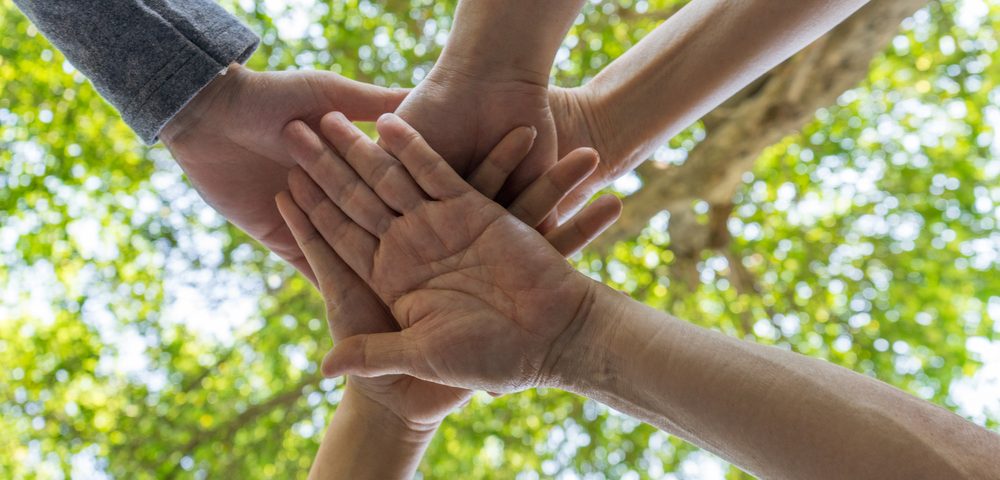Our Caregiving Team of 3 Offered Many Benefits for Mom’s Recovery

Before my mom had a double-lung transplant, my dad was her only caregiver.
Holly, my mom, was reasonably independent until a couple of months before being admitted to the ICU. Ed, my dad, was her companion and helper, encouraging her to walk for exercise and helping her when she felt breathless and tired. He probably did a lot for her that I don’t know about because I wasn’t there during that time.
When my mom was admitted to the ICU, I flew to San Francisco to be with her. I told her, “I’m here as long as I need to be and for as long as it takes.” I needed to be there for her and for me. I would’ve stayed even if she didn’t want me around because being involved kept me sane.
My dad also needed me. The previous month had taken a toll on him as he tried to hold it together while she got sicker. He usually doesn’t talk about his painful feelings — instead, he jokes to lighten the load — but I could see he was exhausted.
So, I signed myself up to be a caregiver. My dad and I were teammates while my mom was in the ICU. We took on different responsibilities and tried to keep each other going when my mom’s condition wasn’t looking great. I took on the technical tasks such as booking accommodations and keeping friends and family in the loop. He made sure we had meals, even if we were eating out too often or heating up a frozen pizza at 11 p.m.
My Aunt Shari also signed on to be a caregiver after the transplant. We knew it would be an intense recovery process and had heard horror stories of caregiver burnout. Shari committed to an indeterminate amount of time far away from her home in Alaska to help my mom recover. My dad would have taken on the task alone, likely without asking for help, if my aunt and I hadn’t been adamant about our participation.
Having three caregivers was good in many ways. I think it’s safe to say that none of us got burnout. We could relieve each other when we needed personal space or wanted to take a break. I was able to spend time with friends in the area, take walks, and zone out if I needed to.
When I caught a cold, I sequestered myself in a corner of the flat away from where my mom was spending time. The others took over my duties while I waited out the illness. It was safer for my mom to be away from me since she was on high doses of immunosuppressant medications. If I had been the only caregiver, my cold would have been a significant problem.
Having three caregivers allowed my dad to take care of tasks such as snow removal at their home in the mountains, three hours away. Those trips home every week or two meant that the house was maintained and the bills were paid. He was able to stay on top of the little things that under normal circumstances were priorities, but could have easily slipped through the cracks during that time. A bonus was that his nerves got a break from the stress of the city.
This arrangement benefited my mom, too. We all had different ways of caring for her that she needed in turn. My dad provided a consistent presence, especially before the transplant. He encouraged her to push herself in physical therapy and provided a steady hand to hold when she was trying to walk without much oxygen or strength. He brought her treats after the doctors removed her tracheostomy.
Shari was a protective older sister who loved on my mom when she needed it. She gave my mom countless head rubs and brought her things to brighten her mood. She did a lot of cooking and was as obsessive about sanitizing and following post-transplant guidelines as I was.
My caregiving was somewhere between the other two. I provided my fair share of foot rubs, and I also gave my mom many pep talks.
While there were many benefits to having multiple caregivers, sometimes we got on one another’s nerves. I wish I could say that we functioned perfectly as a team at all times, but that’s unrealistic. However, we figured out how to get past the occasional moments of friction. We stayed focused on our goal of providing a safe and supportive environment for my mom to recover.
Ultimately, I think the team approach was beneficial for my mom and us — all three of her caregivers.
***
Note: Pulmonary Fibrosis News is strictly a news and information website about the disease. It does not provide medical advice, diagnosis, or treatment. This content is not intended to be a substitute for professional medical advice, diagnosis, or treatment. Always seek the advice of your physician or other qualified health provider with any questions you may have regarding a medical condition. Never disregard professional medical advice or delay in seeking it because of something you have read on this website. The opinions expressed in this column are not those of Pulmonary Fibrosis News or its parent company, Bionews Services, and are intended to spark discussion about issues pertaining to pulmonary fibrosis.








Leave a comment
Fill in the required fields to post. Your email address will not be published.